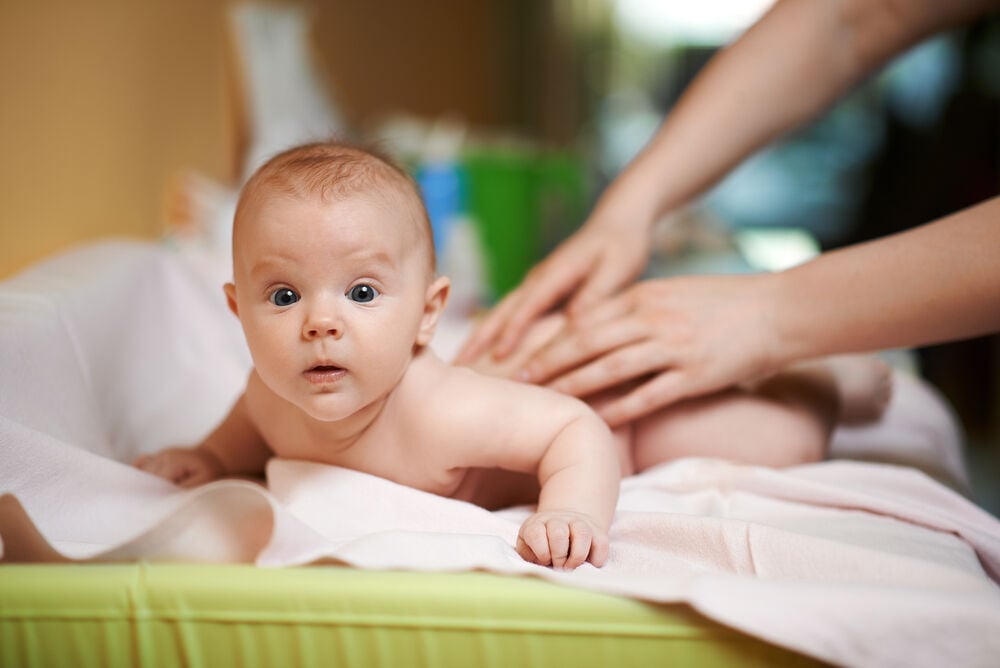-
Tracking cycle
-
Getting pregnant
-
Pregnancy
-
Help Center
-
Flo for Partners
-
Anonymous Mode
-
Flo app reviews
-
Flo Premium New
-
Secret Chats New
-
Symptom Checker New
-
Your cycle
-
Health 360°
-
Getting pregnant
-
Pregnancy
-
Being a mom
-
LGBTQ+
-
Quizzes
-
Ovulation calculator
-
hCG calculator
-
Pregnancy test calculator
-
Menstrual cycle calculator
-
Period calculator
-
Implantation calculator
-
Pregnancy weeks to months calculator
-
Pregnancy due date calculator
-
IVF and FET due date calculator
-
Due date calculator by ultrasound
-
Medical Affairs
-
Science & Research
-
Pass It On Project New
-
Privacy Portal
-
Press Center
-
Flo Accuracy
-
Careers
-
Contact Us
White Baby Poop: What Does It Tell You?


Every piece of content at Flo Health adheres to the highest editorial standards for language, style, and medical accuracy. To learn what we do to deliver the best health and lifestyle insights to you, check out our content review principles.
What causes white poop in babies?
If you notice white poop in your baby’s diaper, you may wonder what’s going on and whether you should be worried. White baby poop can sometimes be a sign of a blockage in a baby’s liver. This blockage is called biliary atresia, and it needs prompt treatment. However, white poop isn’t always serious.
White baby poop, as well as chalky grey or pale yellow poop, can sometimes be caused by a liver blockage. Your baby’s liver cells produce bile, a liquid that helps their body break down fat. In babies with biliary atresia, bile can’t drain out of the liver and gets trapped inside. When bile builds up in the liver, it can quickly damage and scar the liver cells, resulting in cirrhosis. Eventually, biliary atresia can cause liver failure, which is very serious.
Biliary atresia usually appears when babies are between 2 and 8 weeks old. Parents may notice other symptoms in addition to the white poop. Your newborn baby may have jaundice, which causes their skin and eyes to turn yellow. They may lose weight or cry more than normal. Babies with a liver blockage can also develop puffy stomachs because their liver is swollen.
If your baby has white poop and looks or acts sick, consult their doctor right away. If a blockage is suspected, the doctor can perform tests to make a diagnosis. These tests could include blood tests, ultrasound scanning, X-rays or a liver biopsy. While there’s no medication to cure a liver blockage, doctors can perform surgery to get the bile flowing again. This surgery has a good success rate, and the younger the baby is when it’s performed, the more successful it’s likely to be.
However, a liver blockage isn’t the only cause of white poop in babies. Sometimes, babies can get white poop from a milk-only diet. If your baby has white poop but otherwise seems fine, this may be all that’s wrong. If the white poop occurs two or more times, it’s still a good idea to get them checked out by a doctor.
White substance in stool: what's that?
Sometimes, a baby’s normal brown, green, or yellow poop is flecked with a white substance. When you see these white things in poop, don’t worry. While it looks strange, it’s actually totally normal. In babies who eat solid food, it could be undigested food.
If your baby is breastfed, the white substance in stool may look like little white seeds or flecks of cottage cheese. They’re just milk fat that didn’t break down in your baby’s digestive system.
Take a quiz
Find out what you can do with our Health Assistant
Interesting, the amount of fat in breast milk can vary significantly over time. The breast milk that’s produced at the beginning of a feeding session, called foremilk, is low in fat but still contains the protein and nutrients babies need to grow. The milk that’s produced towards the end of a feeding session (called hindmilk) has much more fat. This variation in fat content is why your baby sometimes gets more milk fat than they can digest at once, resulting in white flecks in their poop.
Once your baby gets a bit older and starts eating solid food, you might notice bits of undigested food in their stool. This can happen if they’ve been eating foods that are hard to digest, like corn or high-fiber vegetables. You may already be familiar with this phenomenon since it happens to adults, too.
Is white stool in children dangerous?

White stool isn’t normal for babies, and it’s not normal for older kids, either. If your kids have white poop, they should be evaluated by a doctor. White stool in children could be caused by any number of problems, including tumors or gallstones. However, there are also some harmless causes of white stool in children, such as antacids.
For children of all ages, white stool is a concern. The Mayo Clinic explains that poop gets its normal brown color from bile, so if poop has a pale color, there may be a problem. It could mean that the liver isn’t making any bile or that bile can’t get out of the liver. Tumors can prevent bile from getting into the small intestine; gallstones, which are hardened deposits that form in the gallbladder, can also block the flow of bile. Kids with these conditions may have a fever. They could also be nauseous or have abdominal pain.
Not all causes of white stool are serious. White or pale stool is a known side effect of antacids, which are used to treat heartburn. Children can also have white stool if they’ve recently had a contrast X-ray of their digestive systems. For these X-rays, kids need to drink a white substance, called barium, that enhances the images. The barium can cause discolored stool on the way out.
White stool can sometimes follow diarrhea. When kids have gastrointestinal infections, the balance of bacteria in their digestive systems can get out of balance. This can lead to pale or white poop until the gut bacteria get back to normal, which can take a few days.
If you’re worried about your child’s white stool, call their doctor and ask for their advice. The white stool may be nothing to worry about.
Your baby’s stool color says a lot about their health. If their normally brown, green, or yellow poop has turned white, they may have a serious medical condition. However, white flecks in baby poop aren’t anything to worry about. If you have any concerns about your baby’s poop, ask their doctor for advice.


Hey, I'm Anique
I started using Flo app to track my period and ovulation because we wanted to have a baby.


The Flo app helped me learn about my body and spot ovulation signs during our conception journey.


I vividly
remember the day
that we switched
Flo into
Pregnancy Mode — it was
such a special
moment.
Real stories, real results
Learn how the Flo app became an amazing cheerleader for us on our conception journey.




